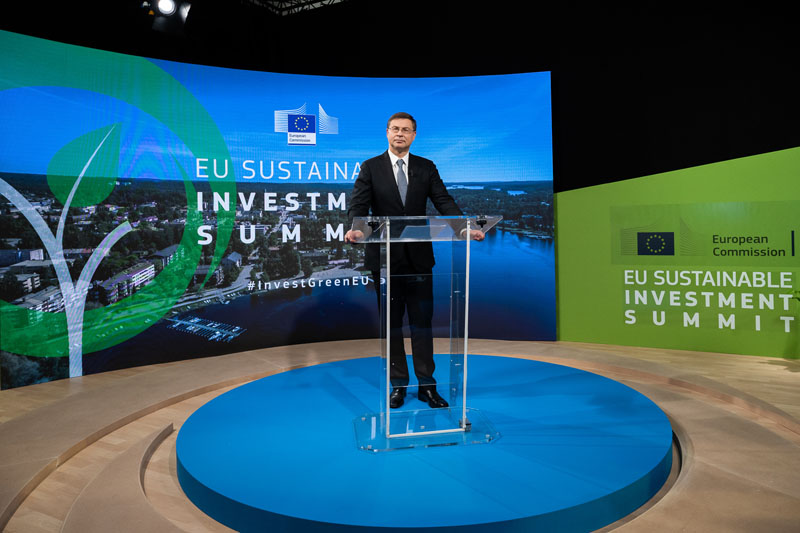Rethinking investment for a greener world
The European Union has put forward an ambitious plan to become the first climate neutral continent by 2050, but how will it meet the massive amount of investment it requires? The first session of the EU Sustainable Investment Summit 2021 focused on how European and international frameworks can help to mobilise finance for sustainable investment.

European Commission Executive Vice-President Valdis Dombrovskis provided an overview of EU actions and the regulatory frameworks put in place since 2018 to foster sustainable finance. He referred to how the Sustainable Investment Plan was devised to make the EU´s green transition a reality and meet the additional annual investments of some €355 billion needed over the next decade to achieve the 2030 target of cutting emissions by 55%.
“Despite the pandemic’s disruptions, its overall implementation is on track. The plan gives us real financing clout - at least €1 trillion over the next decade”, he stated.
The EU has been spearheading the global fight against climate change, but Dombrovskis acknowledged public money will not be enough. To generate private sector investments to support sustainable growth, among other measures, the EU has developed the world´s first taxonomy classification system for sustainable economic activities and will become the largest issuer of green bonds, he explained.
The European Commission´s Executive Vice-President highlighted the need for global cooperation and committed at the summit to building a coalition of trade ministers across the globe who want to take action to promote trade in green goods and services and to promote trade and sustainability.
Sustainable investment is good for business
Michael R. Bloomberg, who participated in the summit in his role as UN Secretary-General’s Special Envoy for Climate Ambition and Solutions, brought into the discussion the market perspective and argued that investing in sustainable measures is good for business as it reduces risks, creates jobs and leads to business gains.
“There is evidence that companies that have policies that a lot of people think are appropriate will have more investment and their stock prices will go up,” he said.
For Commissioner for Financial services, financial stability and Capital Markets Union, Mairead McGuinness, it is key to measure what companies are doing. “If companies are harming the environment or biodiversity, we need to know about it and the company needs to change and invest to not be harmful,” she said.
Central banks and supervisors also have a role to play in the green transition. This is clear to Frank Elderson, Member of the Executive Board of the European Central Bank, who explained that climate change profoundly affects the economy. “We have to analyse what it means for the models that underlie our monetary policy models”, he indicated, acknowledging that these will probably have to change to incorporate climate change criteria.
On his side, President of the European Investment Bank Werner Hoyer explained that all EIB projects are Paris-aligned since the beginning of 2021 and that 50% of their activity will be climate related by 2025. “At the end of this decade we want to have triggered investment of 1 trillion euros in the climate-related field,” he added. For him, the challenge now is making their clients move to Paris-alignment too.
Fixing global inequality for a real climate change revolution
Italian Minister for Ecological Transition Roberto Cingolani brought into the discussion the issue of global inequality and recalled that the definition of green transition is different for countries like Italy and Finland than to African countries, where millions of people do not have access to electricity nor green fuel for cooking.
“In Europe the roadmap is clear, you can change mobility or the way you produce energy, but in other parts of the world we have to start by creating infrastructure for electrification and digitalization,” he noted.
In this line, African Union Commissioner for Agriculture, Rural Development, Blue Economy and Sustainable Environment, Ambassador Josefa Leonel Correia Sacko, voiced the worries of African leaders on how the Green Deal might harm Africa’s structural transformation and could lead to job loss and increased migration. “The EU should do more to support African countries in the initiatives of adaptation and mitigation,” she stated.
“We have to address the 100 billion that we are supposed, as advanced countries, to give to the vulnerable countries for adaptation and mitigation,” said Cingolani, who remembered that at the moment the G20 represents 4.8 billion people producing around 80% of greenhouse gas.
The implementation of the European Green Deal will not only require an entire rethink of our economy and of how we invest, but for it to be fair and inclusive it must also ensure no vulnerable regions or people are left behind.
